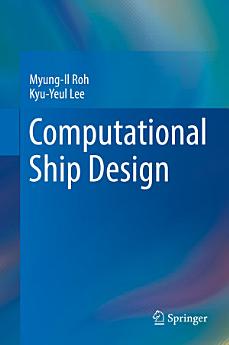Computational Ship Design
About this ebook
Over eight chapters and appendices the book covers the complete process of ship design, from a detailed description of design theories through to cutting-edge applications. Following an introduction to relevant terminology, the first chapters consider ship design equations and models, freeboard calculations, resistance prediction and power estimation. Subsequent chapters cover topics including propeller deign, engine selection, hull form design, structural design and outfitting. The book concludes with two chapters considering operating design and economic factors including construction costs and fuel consumption.
The book reflects first-hand experiences in ship design and R&D activities, and incorporates improvements based on feedback received from many industry experts. Examples provided are based on genuine case studies in the field. The comprehensive description of each design stage presented in this book offers guidelines for academics, researchers, students, and industrial manufactures from diverse fields, including ocean engineering and mechanical engineering. From a commercial point of view the book will be of great value to those involved in designing a new vessel or improving an existing ship.
About the author
Dr Myung-Il Roh is an Associate Professor in the Department of Naval Architecture and Ocean Engineering, Seoul National University, Korea. He is also a Head of Interdisciplinary Program in Offshore Plant Engineering at Seoul National University, Korea from 2016. He received the B.S. degree in 1998, the M.S. degree in 2000, and the Ph.D. degree in 2005 in naval architecture and ocean engineering from Seoul National University, Korea. Before joining the faculty of Seoul National University in 2013, he had worked as an assistant professor of the School of Naval Architecture and Ocean Engineering at University of Ulsan, Korea from 2007 to 2013. His teaching and research interests include design technologies of ships and offshore structures, such as optimization, simulation, computerization, and integration. He is a member of the Board of Directors of the Society for Computational Design and Engineering, an Editor for the PLOS ONE Journal and the International Journal of Computational Design and Engineering, and an Editorial Board member for the International Journal of Ocean Systems Engineering and the Journal of Shipping and Ocean Engineering. He published over 10 lecture notes, 120 journal papers, and 230 conference papers so far.
Dr Kyu-Yeul Lee is a Professor Emeritus in the Department of Naval Architecture and Ocean Engineering, Seoul National University, Korea. He received the B.S. degree in naval architecture and ocean engineering from Seoul National University, the M.S. degree, and the Ph.D. degree in naval architecture from the University of Hannover, Germany. His main areas of teaching and research interests include ship and offshore structure design, optimization, CAD, robotics, and multibody dynamics. He had worked as a research engineer and a lecturer at the University of Hannover and as a principal researcher and a project leader on ‘Computerized Ship Design and Production System’ at the Korea Research Institute of Ships and Ocean Engineering. He published over 10 lecture notes, 150 journal papers, and 300 conference papers so far.







